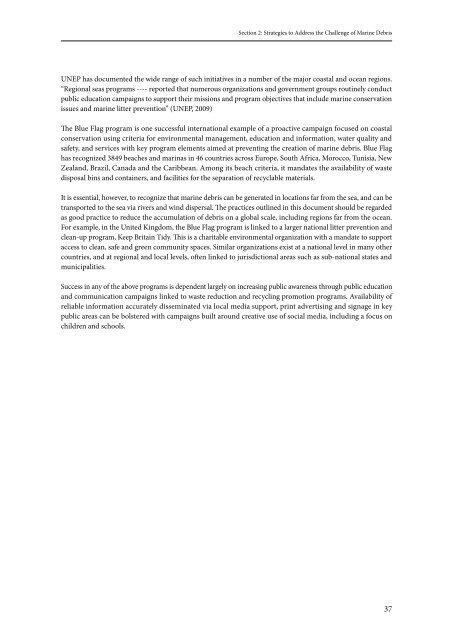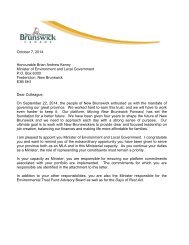cbd-ts-67-en
cbd-ts-67-en
cbd-ts-67-en
- No tags were found...
You also want an ePaper? Increase the reach of your titles
YUMPU automatically turns print PDFs into web optimized ePapers that Google loves.
Section 2: Strategies to Address the Chall<strong>en</strong>ge of Marine Debris<br />
UNEP has docum<strong>en</strong>ted the wide range of such initiatives in a number of the major coastal and ocean regions.<br />
“Regional seas programs ---- reported that numerous organizations and governm<strong>en</strong>t groups routinely conduct<br />
public education campaigns to support their missions and program objectives that include marine conservation<br />
issues and marine litter prev<strong>en</strong>tion” (UNEP, 2009)<br />
The Blue Flag program is one successful international example of a proactive campaign focused on coastal<br />
conservation using criteria for <strong>en</strong>vironm<strong>en</strong>tal managem<strong>en</strong>t, education and information, water quality and<br />
safety, and services with key program elem<strong>en</strong><strong>ts</strong> aimed at prev<strong>en</strong>ting the creation of marine debris. Blue Flag<br />
has recognized 3849 beaches and marinas in 46 countries across Europe, South Africa, Morocco, Tunisia, New<br />
Zealand, Brazil, Canada and the Caribbean. Among i<strong>ts</strong> beach criteria, it mandates the availability of waste<br />
disposal bins and containers, and facilities for the separation of recyclable materials.<br />
It is ess<strong>en</strong>tial, however, to recognize that marine debris can be g<strong>en</strong>erated in locations far from the sea, and can be<br />
transported to the sea via rivers and wind dispersal. The practices outlined in this docum<strong>en</strong>t should be regarded<br />
as good practice to reduce the accumulation of debris on a global scale, including regions far from the ocean.<br />
For example, in the United Kingdom, the Blue Flag program is linked to a larger national litter prev<strong>en</strong>tion and<br />
clean-up program, Keep Britain Tidy. This is a charitable <strong>en</strong>vironm<strong>en</strong>tal organization with a mandate to support<br />
access to clean, safe and gre<strong>en</strong> community spaces. Similar organizations exist at a national level in many other<br />
countries, and at regional and local levels, oft<strong>en</strong> linked to jurisdictional areas such as sub-national states and<br />
municipalities.<br />
Success in any of the above programs is dep<strong>en</strong>d<strong>en</strong>t largely on increasing public awar<strong>en</strong>ess through public education<br />
and communication campaigns linked to waste reduction and recycling promotion programs. Availability of<br />
reliable information accurately disseminated via local media support, print advertising and signage in key<br />
public areas can be bolstered with campaigns built around creative use of social media, including a focus on<br />
childr<strong>en</strong> and schools.<br />
37



